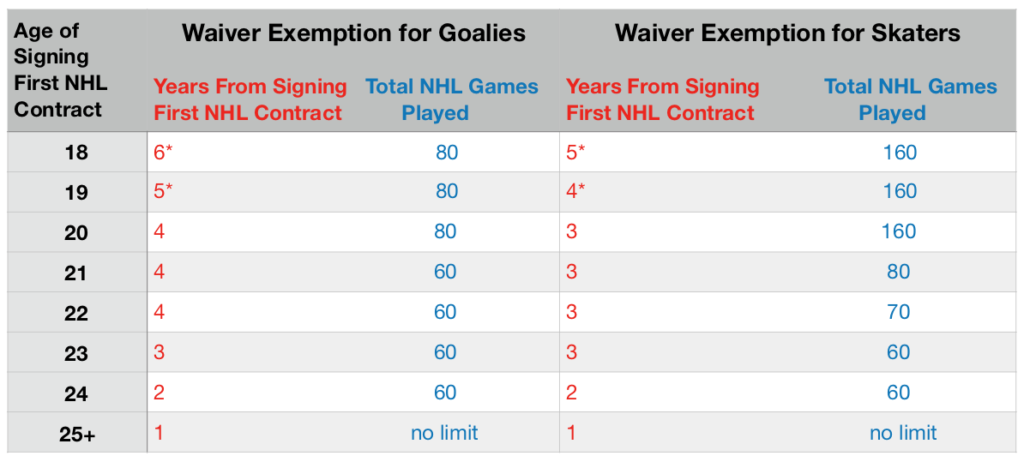Nic Hague and Nic Roy have been reassigned to the Chicago Wolves (The AHL team affiliated with the Vegas Golden Knights). While some may assume that this is performance based, or done to make room for a more senior player, the actual reason is most likely financial.
You see, the Vegas Golden Knights are starting a bye week (the week with no games). Even though there are no games, the team still has to pay salaries and those salaries count against the team’s salary cap space. However many have questioned how much money this really saves, and why the Nics haven’t been placed on waivers yet. So we are going to explain both.
Table of Contents
Waivers
Nic Hague and Nic Roy won’t need to go on waivers this season because they both qualify for the Experience Exemption.
What are waivers? Click here.
Experience Exemption
There are three factors that determine a player’s eligibility for waivers initially: age, years played with an NHL contract, and number of games played.
Depending on the age a player signed his first NHL contract, he is exempt from waivers for a certain number of years or NHL games (regular and postseason). This is outlined below:

Nic Hague signed his first contract at age 18, but turned 19 before December 31st that season, so he is considered 19 by the league. This means that he had four years/seasons or 160 NHL games (whichever comes first) where he is exempt from waivers.
Hague is now 21 and has played 38 games. He is expected to be eligible for waivers in the 2021/2022 season.
Nic Roy also signed an entry-level contract at age 19. He is now 22 and has played only 21 games. He is eligible for waivers next season (2020/2021) based on the number of seasons he’s held an NHL contract.
Cody Glass was not reassigned to the AHL this time, but he could be and has been in the past. He also qualifies for the experience exemption. Cody was 18 when he signed his contract and therefore had five years or 160 games before being eligible for waivers.
Cody is now 20. He has played 37 games. He could be eligible for waivers as soon as 2021/2022 if he plays consistently in the NHL. If not, the number of seasons would catch up to him in the 2022/2023 season.
What about the money?
All three players have signed entry-level, two-way contracts. This means that they have a reduced salary when assigned to the AHL, and that salary doesn’t count against the NHL salary cap.
Nic Hague has an NHL cap hit of $791,667 (that’s his base salary without any performance bonuses). However, when he’s in the AHL he only makes $70,000. Both salaries are prorated throughout the 186 day season. While Hague plays in the NHL, he has a daily cap hit of $4,256. As long as he is assigned to the AHL, he has no cap hit, and the team only pays him a daily rate of $376.
Nic Roy makes $720,000 in the NHL with a daily cap hit of $3,871. In the AHL, he makes an annual salary of $67,500.
Cody Glass earns $863,333 in the NHL, but only $70,000 in the AHL. His daily cap hit in the NHL is $4,642.
To learn the difference between one-way and two-way contracts, and how they affect the salary cap (you may be surprised), click here.
It Makes Sense
You can see how sending these players down to the AHL makes a big difference financially for the team, and carries no risk of losing a player to waivers. The combined daily cap hit the team saves on sending the two Nics down to the AHL is $8,127. Multiply that times every day they aren’t on the NHL roster and you’ve got a decent chunk.
The Vegas Golden Knights could potentially use these savings on a player that the team may acquire before the trade deadline. As of right now, the team only has around $726,623 in projected cap space. If they want to trade for a decent defensemen, they need to save money.
Have more questions about the Salary Cap or other rules of the NHL? Check out our Hockey 101 section!